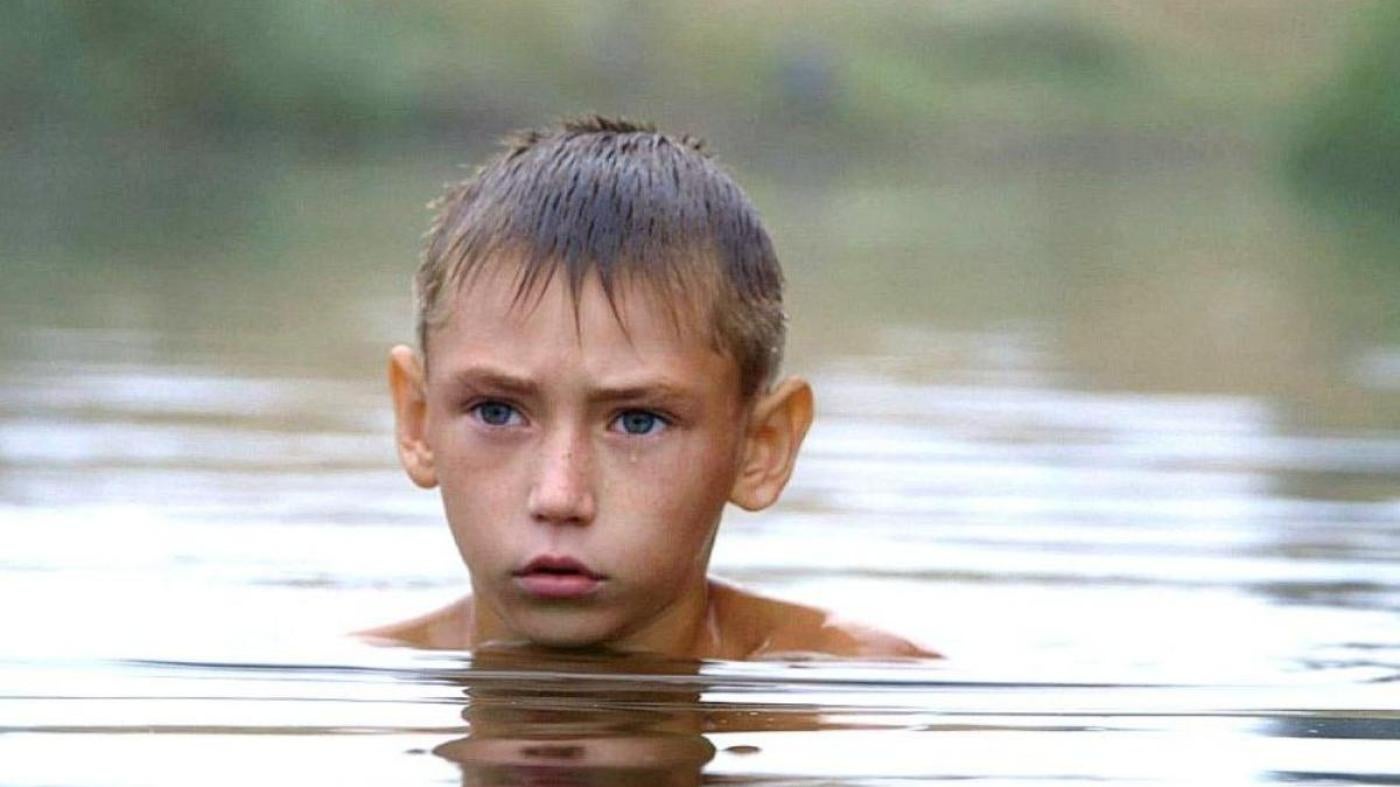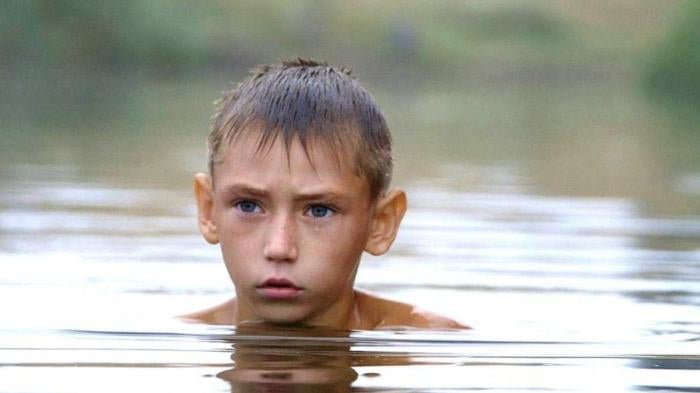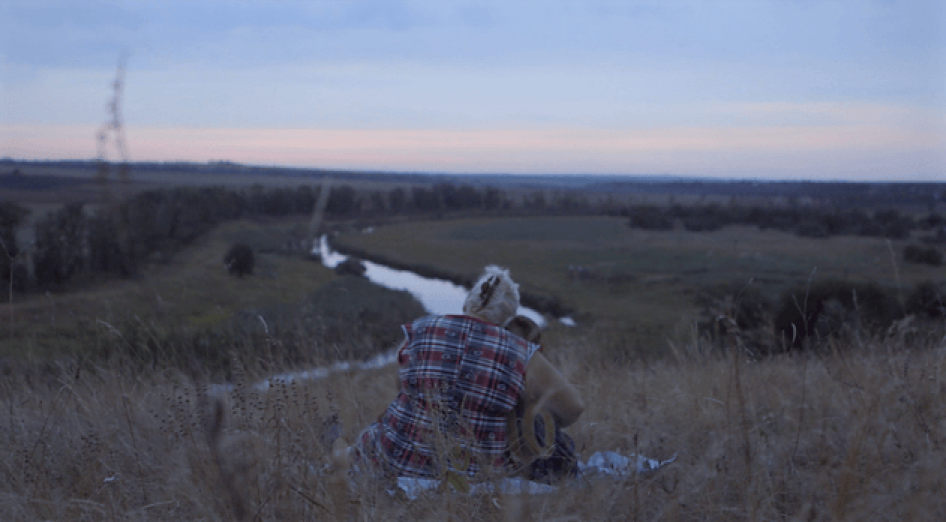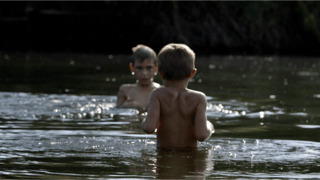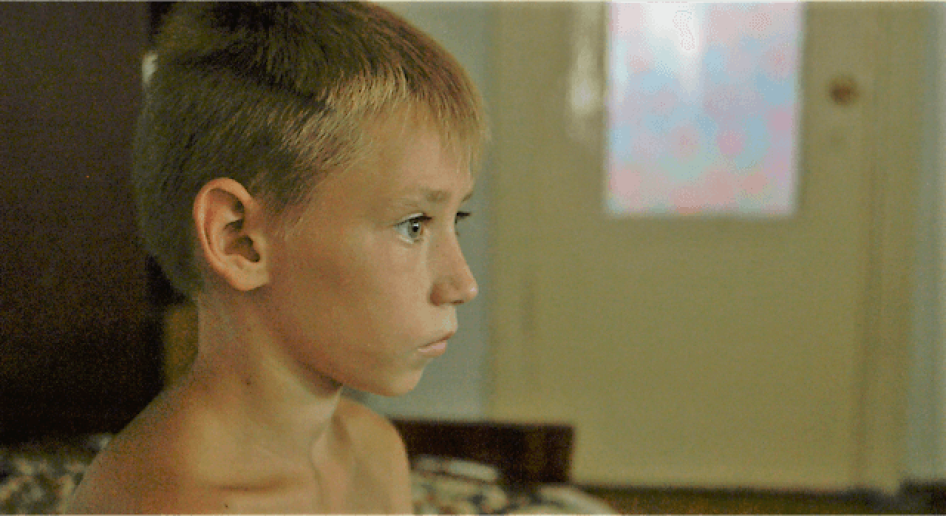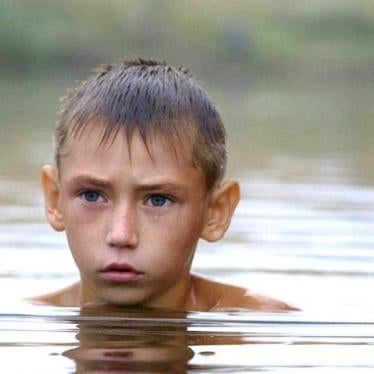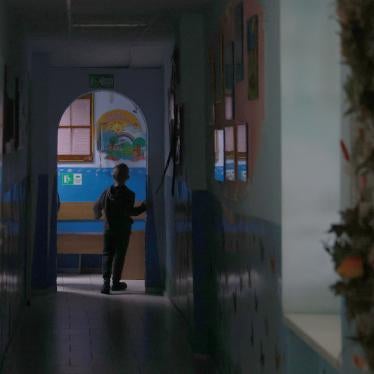Oleg is growing up to a soundtrack of war. He listens intently to the radio as it tells him how many shootings and shellings have taken place near his home, Hnutove, a village in eastern Ukraine that sits right on the line between parts of Ukraine under government control and parts that are under control of Russian-backed armed separatists. It’s the front line of an armed conflict that started four years ago after a public uprising ousted Ukraine’s pro-Russia president, and that drags out, occasionally interrupted by ineffective cease-fires.
He has had to learn the difference between mortars and howitzers, work out which direction the fire is coming from, and to estimate how close it his to the home he shares with his loving and protective grandmother, Alexandra, and his goofball younger cousin, Yaric.
The director and filmmaker, Simon Lereng Wilmont, recalls the moment he knew Oleg would be the boy he followed for his documentary, The Distant Barking of Dogs, which shows viewers war through the eyes of a child. Travelling down the southern part of the 280-mile line of contact separating areas held by Ukrainian forces and those by Russian-backed armed groups, he asked every child he came across what it felt like to be afraid.
“It’s like there is this cold hand reaching into my chest, grabbing my heart, and when the first shells start to explode, the hand starts squeezing it, little by little, until my heart is a little, cold lump. That’s how I feel, when I am afraid,” was Oleg’s answer as he looked at Wilmont with ice-blue eyes.
“That was it for me,” Wilmont said. “I knew I had to make a film about this child and his amazing grandmother, Alexandra.”
The Distant Barking of Dogs, which will be screened as part of the Human Rights Watch Film Festival on Monday, June 18 and Tuesday, June 19, follows Oleg from January 2016 until the middle of 2017. In that short time, he deals with separation from family, injury, and illness, all to the background noise of war.
More than 425 civilians were killed in 2017 in the conflict between the Ukrainian government and separatist armed groups supported by Russia. Since the conflict began in 2014, about 3,000 civilians have been killed, with more than 10,000 deaths in all, and nearly two million people internally displaced – fleeing their homes and the danger they would face if they remained.
Hnutove sits on the Kalmius river, where Oleg goes swimming with his friends and which became the boundary between land controlled by Russian-backed armed groups and Ukrainian government-controlled territory.
As more people leave the town to find safe haven elsewhere, Hnutove starts to feel abandoned. Empty seats in classrooms outnumber those occupied by children, and life becomes harder and harder. Despite this, Alexandra and Oleg stay put. As Alexandra says, “Every dog is a lion in its own home.”
The motivations behind the decision to stay seem complicated and rooted in survival and belonging. Wilmont said that some people returned to the village after initially leaving, painting a distressing picture of conditions for people who are internally displaced.
“[Alexandra] knows deep in her heart that she can sustain life for both her and Oleg by living off [their small plot of land],” he said. “There is both a fierce pride and a much-needed feeling of security in this knowledge. Leaving would – in her mind – mean saying goodbye to the only sure means of day-to-day survival that she knows, and that’s no easy thing to do.”
Alexandra was stuck between the decision to leave to an insecure life in a strange place, or one in a place she knows in her bones, but surrounded by war.
Wilmont witnessed first-hand the toll war was taking on Oleg. Some nights he would be scared to sleep – staying awake fully clothed until the early hours of the morning. And yet the next day he would ignore the shelling, acting totally indifferent to the sounds of mortars falling close by.
“It’s evident he already has some inner scars,” Wilmont said. “That said, there is absolutely no doubt in my mind that Oleg would be so much worse off if he didn’t have his beloved babushka, Alexandra, to care for him and shelter him as best as she can from the worst of the ugliness of the war.”
Despite this protection, Oleg has had learn things no child should know.
“Oleg has been forced to become wise to the many sounds of war, “so that he knows whether to run for the basement or not,” Wilmont said. “No child should have to carry that kind of knowledge in their head, and I definitely think that has aged him beyond his years.”
Throughout the documentary, Oleg’s friendships become precious, and two other boys – Kostya, a teenager who offers a glimpse of who Oleg may become, and 8-year-old Yaric, Oleg’s cousin who acts like his shadow – share in his adventures and his traumas.
But no relationship is more important than the bond between Oleg and Alexandra.
“Alexandra is Oleg’s all and everything. As he is hers,” Wilmont said. “As I see it, Oleg brings strength, hope and laughter into Alexandra’s life, whereas she gives him all the stability, emotional shelter, and warmth he needs to grow up and become a good and decent human being, despite the sad and terrible circumstances of their present reality.”
That is the message Wilmont hopes people will take away from The Distant Barking of Dogs – of mutual support during hard times and the need to embrace the fact that people are so much stronger together, than on their own.
The conflict in Ukraine may have fallen from people’s consciousness, but that doesn’t mean it has gone from the lives of people living in its shadow. As recently as May, a checkpoint in Oleg’s village was shelled twice, media reports said. Wilmont also hopes, perhaps naively he says, that the documentary might remind people of the many civilians suffering on both sides of the front line.
As he told Human Rights Watch, conflict is a sad reality for many children in the world, and he wanted to give the children caught in this particular conflict a voice. The documentary is about what growing up in the midst of war does to a child, and how crucial family and close personal relationships are if a child is to survive with as few inner and outer scars as possible.
The person doing the most to save Oleg from some of these scars is undoubtedly Alexandra.
“Her love for him is truly out of this world, and she is doing an amazing job,” Wilmont said. “So at the end of the day I’m optimistic on Oleg’s behalf.”
